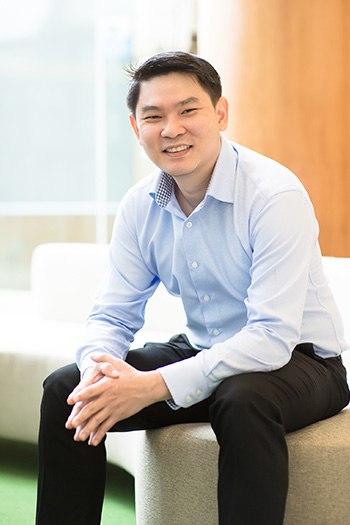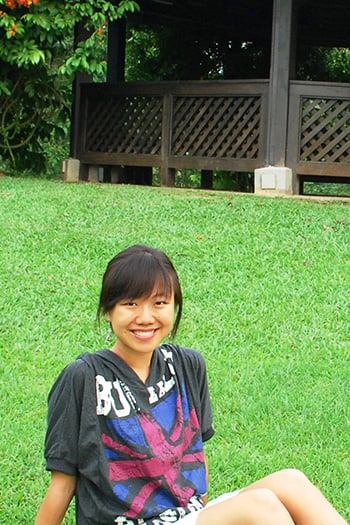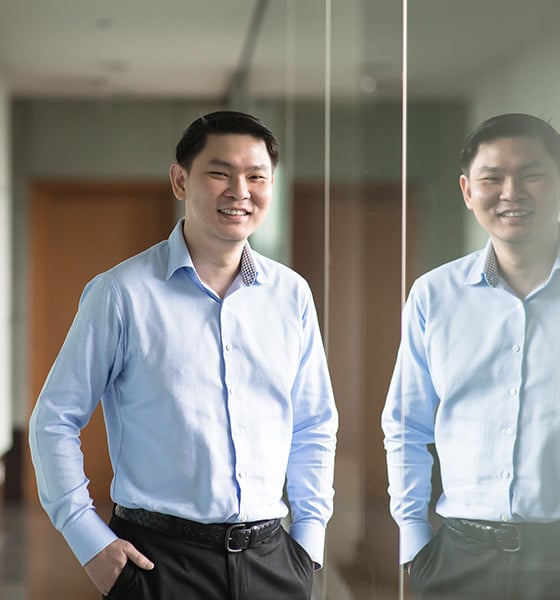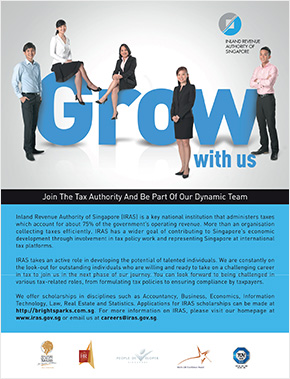The Lehman Brothers’ collapse was a seminal event that greatly intensified the 2008 global financial crisis and contributed to the erosion of billions of dollars in global equity markets. This significant event will always remain etched on Robin Ng’s memory, who at the time of the collapse was seconded to the Tax Policy Directorate in the Ministry of Finance (MOF).
He recalls, “The collapse threatened the financial stability of many countries. As an officer who was new to his posting, it was challenging to be in the midst of implementing policies to help Singapore companies get the liquidity needed to keep their business going. It certainly helped to have a team of supportive colleagues and supervisors who helped to conceive ideas and fine-tune our policies before the fiscal year budget was announced in February.”

Robin Ng Chun Wee
IRAS Merit Undergraduate Scholar,
IRAS Postgraduate Scholar
Designation: Manager,
International Tax Affairs and Relations
Studying: Master of Laws in International Tax Law, Vienna University of Economics and Business, Austria
Bachelor of Accountancy,
Nanyang Technological University
Robin’s journey with IRAS has been nothing short of eventful. He joined IRAS’ Enforcement Division, where he had a hand in recovering property tax and reviewing work procedures. He then joined the Revenue Accounting Branch and the Corporate Tax Division, before moving to the Tax Policy Directorate. Robin was also given a postgraduate scholarship to pursue a Master of Laws in International Tax Law.
Subsequently, Robin was seconded to the Organisation for Economic Co-operation and Development (OECD) in Paris for two years to conduct peer reviews to assess if various jurisdictions were adhering to the agreed International Standard on Exchange of Information. During this two-year stint, Robin was responsible for the peer reviews of Marshall Islands, Finland, Portugal, Jamaica, Antigua and Barbuda and the Former Yugoslav Republic of Macedonia.
Today, Robin is a Manager in the International Tax Affairs and Relations Branch, and his current job scope includes managing the Exchange of Information (EOI) policy function as well as supporting IRAS’ international engagement efforts, which requires him to regularly participate in international tax conferences. He shares, “Attending these conferences are important to ensure that external developments do not affect our interests adversely. This plays a large part in helping to further Singapore’s interest in a globalised world.”
Influencing Direction
The regular tax conferences that Robin attends provide a platform for government representatives to come together to share experiences and seek solutions to common tax problems. He tells us about a global problem associated with Base Erosion and Profit Shifting (BEPS) and his role in ensuring that Singapore’s interests are safeguarded. He explains, “When countries face fiscal deficits, they naturally start looking at ways to collect more taxes. In principle, there is nothing wrong for countries to collect their fair share of taxes from economic activities taking place within their jurisdictions.
“Nevertheless, we have to guard against protectionism from creeping into the international agenda. Some countries face political challenges and difficulties in restructuring their economy and to implement much-needed structural reforms that will allow them to remain competitive in a globalised world. An easy way out for some of them might be to favour tax policies that restrict and impede cross-border investments in the hope that such policies will slow down or even reverse the outflow of investments and the associated jobs from their country.
“It is thus important for Singapore, as a small country that relies heavily on foreign investments, to participate in and influence international tax policies development to ensure that policies developed are based on fair and equitable principles and our interests are adequately safeguarded.”

Lee Hui Yi
IRAS Overseas Undergraduate Scholar
Studying: Bachelor of Arts (Economics),
University of Cambridge, UK
21-year-old Lee Hui Yi is eager to join Robin in IRAS’ dynamic work environment. Hui Yi is currently pursuing the Bachelor of Arts in Economics at the University of Cambridge in the UK under IRAS’ Overseas Undergraduate Scholarship. She keeps an open mind for her first posting and recognises that willingness to learn is of prime importance, regardless of where she is posted.
She tells us, “I am excited to gain hands-on experience and progress along the specialist track. Studying is great for developing my knowledge, but nothing beats learning on the job. IRAS officers also enjoy the opportunity to undergo job rotations once every two to three years, and I look forward to gaining as much exposure as possible.”
Hui Yi shares that her scholarship is more than just a ticket to an overseas education – it is an opportunity to take advantage of the experiences that follow it, so that she can tap on her insights gained and contribute to IRAS’ work more effectively. She tells us, “I had the chance to complete an internship at IRAS last year, during which I liaised with taxpayers and helped resolve their queries. My internship honed my technical competencies and my communication skills, thereby giving me a head start in preparing for my future career.
“Furthermore, my education in the UK has allowed me to hear what leading academics have to say about the recent financial crisis. It is interesting to hear their thoughts especially when I’m in the UK and so close to the Eurozone.”
Contributing to Nation Building
The idea of the tax authority may not sit well with many people, but both Robin and Hui Yi patiently explain that tax revenues serve a critical function in developing our infrastructure and defence force.

Hui Yi adds, “One cannot even begin to imagine what Singapore would be like without well-maintained roads and street lights, which are made sustainable with our tax revenues. IRAS also has the important task of ensuring that tax collection is properly enforced, so that each individual pays his due and no one shoulders an unfair burden. The work that IRAS does is comparable to the functioning of the heart – both work quietly and are essential for survival, but people don’t always take notice of their importance.”
Robin agrees, adding, “IRAS does more than just collect money for government funding. It is also tasked to safeguard Singapore’s interests in the international fora. Furthermore, our work is important because we help shape policies that keep our tax regime simple and competitive, ensuring that Singapore can continue to attract investments, achieve sustainable growth and create good jobs for Singaporeans.”
Developing Her People
IRAS’ work goes beyond developing our nation – it also works towards developing its officers. Hui Yi shares, “IRAS supports us by giving us opportunities that will enhance our skillsets and abilities. One of the ways IRAS shows its support is characterised by my opportunity to attend summer courses at Harvard University.”
As for Robin, the combination of his changing portfolio and the nature of his diversified work both within and outside of IRAS has given him a macro view of the complex tax system and contributed to his professional development. He tells us that IRAS is a big organisation that values different people with different skillsets, and opportunities within IRAS abound. He shares, “Opportunities are always there. The important thing is to capture these opportunities and take up its associated responsibilities, and work towards delivering results.
“My changing portfolio has taught me the importance of learning and unlearning. It is also important to remember that while you may not like certain tasks, you must keep an open mind and understand that these little tasks will better prepare you for the future – when bigger tasks await you.”

